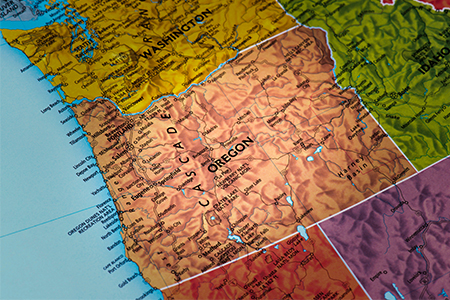You May Also Like
HOW TO BECOME A CPA IN OREGON – EXAM & LICENSE REQUIREMENTS 2024
Oregon’s Board of Accountancy has specific requirements that are unique compared to other states.

The world of accountancy is far more varied than the average person might assume. There are accountants who work with the IRS, with law enforcement, in corporate banking and in fraud and loss prevention. Accountants also help to keep corporations running smoothly with audits and other consultations. When you decide to take the plunge into this exciting career, you will want to consider becoming a Certified Public Accountant (CPA). It is the top license available to an accountant. With a CPA, you can sign tax documents and a lot more. Each state has particular requirements for these premiere licenses, including Oregon. Keep reading to learn how to become a CPA in Oregon.
General Expectations
Oregon’s Board of Accountancy has specific requirements that are unique compared to other states. For that reason, it is important to start your path to a CPA license armed with all of its particular requirements. For instance, Oregon has a specific breakdown for how you meet its 150 semester hour academic requirement as well as its experience expectations. The state does not need you to be a resident, a U.S. citizen or of any particular age. However, you will need a Social Security number and at least a bachelor’s degree.
Academic Standards
In order to satisfy the Board, you will need to do a lot of academic work. Each course should be preparation for the CPA examination and your subsequent career, so work hard. The state requires a minimum of 150 semester or 225 quarter hours* that breakdown as such:
24 semester hours, or 36 quarter hours studying upper division accounting including, but not limited to:
- Auditing
- Taxation
- Cost Accounting
- Financial Statements
- Theories of Accounting
24 semester hours, or 36 quarter hours studying business or accounting-related courses such as:
- Business Law
- Business Communications
- Economics
- Corporate Finance
- Business Ethics
You may take courses from online or community colleges, provided that the credits transfer to a four-year institution, from which you graduate with a minimum of a bachelor’s degree. You will still need to request official transcripts from all institutions you attend, however, so be sure to keep records of all institutions and how to contact their registrar’s offices.
Before embarking on an accounting education, investigate the school and its program. It is imperative that they be accredited by an acknowledged agency. Discuss this with your admissions counselor or your academic advisor and ensure that your work is accredited by a regional agency such as:
- Southern Association of Colleges and Schools
- New England Association of Schools and Colleges
- North Central Association of Colleges and Schools
- Northwest Commission on Colleges and Universities
- Western Association of Schools and Colleges
- Middle States Association of Colleges and Schools
If you graduated from a foreign institution, or even took a few courses overseas from a non-U.S. accredited institution, you will need to have those courses evaluated. Contact the NASBA International Evaluation Services to have them look over your international transcripts so that they might be approved for your Oregon licensure application.
CPA Examination
Once you have earned the appropriate credits and degree, you can apply to sit for the CPA examination. You will submit your transcripts to the board when you are ready to take the exam. Once approved, the board will send you a Notice to Schedule. Once received, you have six months to schedule, sit and pass at least one part of the exam. You will have a rolling 18 month period in which to complete and pass all four parts, starting from the day you take the first part.
The exam is a test created by the American Institute of Certified Public Accountants (AICPA) and is constantly upgraded by member CPAs who design test items that reflect contemporary issues. It is considered to be one of the most difficult professional exams. In fact, up to half of all test takers must retake parts of the exam before receiving their license.
The four exam parts are:
- Financial Accounting and Reporting–This covers financial reporting frameworks from several industry experts. Candidates are asked to compare statements that reflect different reporting standards.
- Auditing and Attestation–You’ll be tested on your knowledge of the International Standards of Auditing as well as U.S. standards.
- Regulation–The ethics part of the exam, your professional and legal responsibilities are covered in this test.
- Business Environment and Concepts–This portion covers general business concepts and international business. Written communication skills are vital to pass this part of the exam.
AICPA Ethics Exam
Once you have taken and passed the CPA examination, you will have one more test: the AICPA’s Ethics exam. You can order an 11-hour self-study course from the association and then take the open-book test. The Ethics Examination is not supposed to be terribly difficult, but you will need to pass with a minimum score of 90 to receive your license.
Experience
The capstone of the licensure process is your practical experience. Oregon requires 2,080 hours of experience under the tutelage of a licensed CPA. Before beginning your experiential portion, be sure to provide your supervisor with a copy of the Board’s Instructions to Supervisor/Licensee Employer, which should serve as a guide for your work and how to verify the same. Once you have finished your 2,080 hours, have your supervisor complete the Certificate of Experience, which is provided by the board.
After you have completed your CPA license, you can practice in the state of Oregon. The state is bustling with all sorts of opportunities across a range of industries. For more information, visit the Board’s official website: Oregon Board of Accountancy.